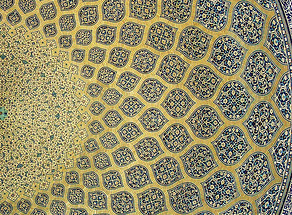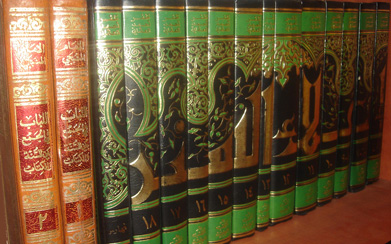[Continuing from the talk of “Obligation of Tablīgh”, Maulāna Ashraf Ali Thānvi rehmatullāhi alayh says]
 These days some people have started to think that the work of tablīgh is the sole duty of ulamā. If it is the sole duty of ulamā then let these ulamā also keep fast on your behalf, and you may go ahead and live a life free of any religious restriction. This is just like some villagers used to think and perhaps there is still a place where similar thinking may exist.
These days some people have started to think that the work of tablīgh is the sole duty of ulamā. If it is the sole duty of ulamā then let these ulamā also keep fast on your behalf, and you may go ahead and live a life free of any religious restriction. This is just like some villagers used to think and perhaps there is still a place where similar thinking may exist.
One Pīr sāhib (“saintly” person) came to one town and met the chief there. The chief saw that this Pīr was very frail and thin, so he asked, “O Pīr, you are very skinny. Are you even healthy?”
The Pīr replied, “Why should I not be so skinny when you people do not pray, so in your place I have to pray; when you people don’t fast, so I have to fast in your place; and what is even more difficult is that, instead of you I will be the one to cross the bridge in hereafter, the bridge that is thinner than a hair and sharper than a sword’s edge.”
The chief said, “Amazing! You do so much! Go I give you that certain farm land”
The Pīr thought for a moment that this fellow is a villager. There is no knowing when he will turn away from his statement so let me solidify this deal. The sooner I take ownership of the land, the better. Hence, he said to the chief, “Khan Sahib, then get me the ownership on that land.
The chief took the Pīr to the land. While they were going the passed through the ups and downs of the farm area, zigzagging through the canals and through a thin pathway (which is normally in between two farms and is slightly raised). This pathway was so thin, that the Pīr had to balance himself nicely. While balancing himself the Pīr slipped and fell into a ditch by one side of the pathway.
The chief saw this and gave a nice kick in the back of the Pīr and said, “You were saying that you will walk the bridge which is thinner than a hair and sharper than a swords edge and you could not even cross this pathway which is hand span wide! You lie. I take my words back; there is no land for you!”
So these poor villagers (because of lack of knowledge) have made their belief that this praying and fasting is something for the Pīrs and Ulamā to do. We are not liable for anything. This is same as the Christians who say that Īsā alayhi salām has compensated for all the sins on their behalf. Moreover, some sufiya got this kashf (unveiling) that all of the followers within their tarīq (path of Tazkiyah) will be forgiven. When this information reached the (jāhil [ignorant]) inheritors in these tarīq , they started to misguide the masses with it. This kashf does not mean that the murīds (seekers) of that tarīq would neither have to pray nor keep any fasts. After all even Rasulullah salallāhu alayhi wasallam has also been promised that his Ummah will be forgiven, so should we now start to think that there is no need for Salāh and Fast for this whole Ummah?
One Sahābi radiallāhu anhu had once requested Rasulullah salallāhu alayhi wasallam that he wishes to gain closeness to Rasulullah salallāhu alayhi wasallam in Jannah. So Rasulullah salallāhu alayhi wasallam said to him,
ولكن اعنى على نفسك بكثرة السجود
Help yourself through excessive prostrations..*
Thus Rasulullah salallāhu alayhi wasallam gave the solution for this request. Anyone who wishes to be close to him salallāhu alayhi wassalam should rely on establishing plenty of Salāh. This hadīth clearly indicates that the benefit in these different turuq (pl. for tarīq ) is dependant on the condition that one who will tread the path of that Pīr (i.e practice on all the struggles and exercises of the tarīq ). Anyway, what I was saying is that if Tablīgh was a sole duty of the Ulamā then we should hand over these Salāh and Fasts to some Pīr/Alīm as well and live freely. These Ulamā will carry the entire burden.
I do not say that there is no distinction between the Ulamā and Laymen. The distinction is indeed there but the Ulamā are not the bearer for the entire task. The detail in this is as follows:
Address (speech) is of two Categories, which are further divided into two types.
Category 1:
- General Address to masses
- Specific Address to individuals
Category 2:
- خطاب بالمنصوص (Address pertaining major issues of Dīn).
- خطاب بالاجتهاد (Address pertaining to detailed issues of Dīn)
In the above, from within “Category 1” the first type (i.e. General Address to masses) is restricted to the Ulamā. Only their speech will be beneficial for the masses because people have trust in these Ulamā and see them as their leader. This is contrary to a layman who would not be beneficial in this type of an address because people do not regard him worthy of leadership and thus his address will not be effective.
As for the second type within this category (i.e. Specific Address to individuals), then this is not restricted to Ulamā. Anyone can give advice and guide another person on an individual bases.
Similarly, in “Category 2” the “خطاب بالمنصوص (Address pertaining major issues of Dīn)” can be done by anyone and is not restricted to Ulamā. Anyone can give this speech aloud. This address refers to those issues which every muslim ought to know in any case, like “we should believe in Allāh”, “pray five times”, “fast the month of ramadhan” etc. 1
The last type in “Category 2” (i.e خطاب بالاجتهاد (Address pertaining to detailed issues of Dīn)) is restricted only for the Ulamā. These addresses include specific issues pertaining to the laws of Shariah. Laymen will err in relaying such an address. An Alīm generally is aware of lot of maxims within the Shar’ī Law, so much so that he will not err, and even if one Alīm does not know a specific maxim then the glory of his knowledge is such that he will not shy away from saying “لا ادرى” (I do not know). Nonetheless, such issues require an in depth understanding.
Similarly to give an address to masses and then explain the Shar’ī rulings is restricted for the Ulamā, while to address major and well known aspects of Dīn on an individual basis is not restricted to the Ulamā.
This is why Allāh mentions in one place:
وَلْتَكُنْ مِنْكُمْ أُمَّةٌ يَدْعُونَ إِلَى الْخَيْرِ…
There should be a group among you which calls towards good… (3:104)
Here the action of Da’wah has been made restricted to one particular group. And later on Allāh says:
كُنْتُمْ خَيْرَ أُمَّةٍ أُخْرِجَتْ لِلنَّاسِ تَأْمُرُونَ بِالْمَعْرُوفِ وَتَنْهَوْنَ عَنِ الْمُنْكَرِ
You are the best of nations who has been raised for the mankind. You enjoin the good and forbid the evil… (3:110)2
In this ayah, the task of enjoining good and forbidding evil has been kept general, hence everyone is addressed. This also gives us the indication that enjoining good and forbidding evil has one particular level which is obligatory for everyone and is not restricted to Ulamā alone. The detail has been given above.
 Aside from this, there is another distinction understood from these ayāt, between the role of Ulamā and the Laymen. This distinction is that one group will be such that it will always be in the work of tablīgh by enjoining good and forbidding evil, while another group will be such that it will carry out this duty of tablīgh according to the time and place.3 This is mentioned in the second ayah. This is called distribution of task and no nation can advance unless it has some form of distribution of tasks. Thus Ulamā’s role in Da’wah and Tablīgh is such that they are always engaged in it; while the laymen will do their part of Tablīgh is specific times and places (which ever are most suitable). This is because Allāh made the salvation from the loss dependent on Tawasī bil haqq and Tawasī bis Sabr in Suratul Asr; hence making this an obligation on ALL (ulamā and laymen alike)4.
Aside from this, there is another distinction understood from these ayāt, between the role of Ulamā and the Laymen. This distinction is that one group will be such that it will always be in the work of tablīgh by enjoining good and forbidding evil, while another group will be such that it will carry out this duty of tablīgh according to the time and place.3 This is mentioned in the second ayah. This is called distribution of task and no nation can advance unless it has some form of distribution of tasks. Thus Ulamā’s role in Da’wah and Tablīgh is such that they are always engaged in it; while the laymen will do their part of Tablīgh is specific times and places (which ever are most suitable). This is because Allāh made the salvation from the loss dependent on Tawasī bil haqq and Tawasī bis Sabr in Suratul Asr; hence making this an obligation on ALL (ulamā and laymen alike)4.
Khutbāt Hakīmul Ummat, vol. 13, pg. 161-165
* الآحاد والمثاني – (ج 4 / ص 229) #2387
Notes:
1. The work of Jama’atut Tablīgh will fall under this category where they call people towards one of the most important command of Dīn (i.e. Salāh).
2. No one should question about the difference of translation in two instances. In first ayah the أُمَّةٌ has been translated as “group” while the same أُمَّةٌ in the second ayah has been translated as “nation”. The reason is simple. In the first ayah, the word أُمَّةٌ is preceded by the word مِنْكُمْ (the مِنْ is called min tab’īdiyyah) which means “from among you”. If the whole Ummah is one nation, then a portion from it is a group of that nation, hence مِنْكُمْ أُمَّةٌ will be translated as “a group among you”.
3. Ulamā have said Labayk to the work of the Prophets alahimus salām, hence their duty entails a round the clock Da’wah, whether it is in the form of Addresses, Teaching, Writing, or Giving decree etc. Where as the Laymen masses are also obliged to carry out their share of this duty, however they are only liable for whatever time they can spend aside from their normal life. The more time they will spend in this task, the more rewards will they reap.
4. This also makes an indication on the aspect of Jama’atut Tablīgh using their stipulation of specific days as an administrative measure to help laymen fulfill their religious obligation of Dīn. However, one should note that the obligation is not limited to the time spent in these stipulated times, rather whenever they find an opportunity to advise a fellow Muslim brother, they should avail it. Moreover, this stipulation of the time in Jama’at (aside from other many benefits) is only for him to learn how to carry out this obligation on an individual basis at times other than that spent in Jama’at.
5. Please note that Maulāna Ashraf Ali Thānvi rehmatullāhi alayh does not deal with the work of Jama’atut Tablīgh in these talks, however their understanding gives us insights about the issues related to this Jama’at as well.
-Abuhajira